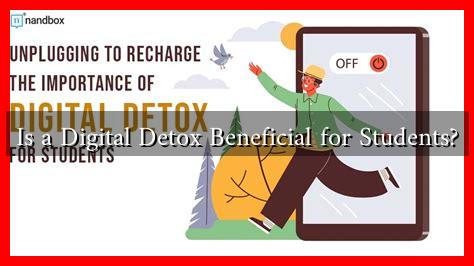-
Table of Contents
Is a Digital Detox Beneficial for Students?
In an age where technology permeates every aspect of our lives, the concept of a digital detox has gained significant traction, especially among students. With the constant barrage of notifications, social media updates, and online distractions, many are beginning to question the impact of excessive screen time on their mental health and academic performance. This article explores the benefits of a digital detox for students, supported by research, statistics, and real-life examples.
Understanding Digital Detox
A digital detox refers to a period during which an individual refrains from using digital devices such as smartphones, computers, and tablets. The goal is to reduce stress, improve focus, and enhance overall well-being. For students, who often juggle academic responsibilities with social media and entertainment, a digital detox can be particularly beneficial.
The Impact of Screen Time on Students
Research indicates that excessive screen time can lead to various negative outcomes for students, including:
- Decreased Academic Performance: A study published in the journal Computers & Education found that students who spent more than three hours a day on social media had lower GPAs compared to their peers.
- Increased Anxiety and Depression: The American Psychological Association reports that heavy social media use is linked to higher levels of anxiety and depression among adolescents.
- Sleep Disruption: The blue light emitted by screens can interfere with sleep patterns, leading to fatigue and decreased cognitive function.
Benefits of a Digital Detox for Students
Engaging in a digital detox can yield numerous benefits for students, including:
- Improved Focus and Concentration: By reducing distractions, students can enhance their ability to concentrate on their studies. A study from the National Institutes of Health found that students who took breaks from screens reported better focus and retention of information.
- Enhanced Mental Health: A digital detox can lead to reduced anxiety and improved mood. A survey conducted by the Mental Health Foundation found that 70% of respondents felt less stressed after taking a break from their devices.
- Better Sleep Quality: Limiting screen time, especially before bed, can improve sleep quality. The Sleep Foundation recommends avoiding screens for at least an hour before sleep to promote better rest.
- Increased Social Interaction: A digital detox encourages face-to-face interactions, fostering stronger relationships and social skills. Students often report feeling more connected to their peers after spending time away from screens.
Real-Life Examples and Case Studies
Several educational institutions have recognized the importance of digital detoxes and have implemented programs to encourage students to unplug. For instance:
- University of California, Berkeley: The university launched a “Digital Detox Week,” where students were encouraged to limit their screen time and engage in outdoor activities, resulting in improved mental health and academic performance.
- High Schools in Finland: Some Finnish high schools have adopted “no-phone” policies during school hours, leading to increased student engagement and participation in class discussions.
How to Implement a Digital Detox
For students looking to embark on a digital detox, here are some practical steps to consider:
- Set specific goals: Determine how long you want to unplug and what activities you will engage in instead.
- Communicate your plans: Inform friends and family about your detox to manage expectations and encourage support.
- Find alternative activities: Explore hobbies, sports, or reading to fill the time usually spent on devices.
- Gradually reduce screen time: If a complete detox feels overwhelming, start by limiting screen time gradually.
Conclusion
In conclusion, a digital detox can be highly beneficial for students, offering improvements in focus, mental health, sleep quality, and social interactions. As technology continues to evolve, it is crucial for students to find a balance between their digital lives and real-world experiences. By taking the time to unplug, students can enhance their academic performance and overall well-being, paving the way for a healthier, more productive future.

